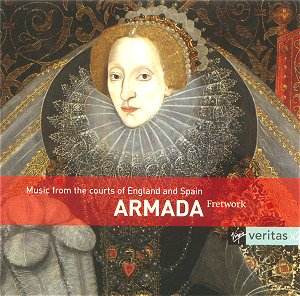Collection: Music from the Courts of England and Spain.
ARMADA
 Fretwork
Fretwork
 Virgin Veritas 2 CDs VBD5 61821 2 [CD1: 61:38] [CD2:
59:15]
Virgin Veritas 2 CDs VBD5 61821 2 [CD1: 61:38] [CD2:
59:15]
(Reissue - the recording was first released in
1988)
Crotchet
Amazon
UK Amazon USA £8.99

The title of Armada is somewhat misleading for there is little here to suggest
war or anything martial and the music comes from the early Stuart as well
as the late Tudor age. The title conveniently umbrellas a fascinating collection
of music by well-known English and less celebrated Spanish composers of the
period. The 2 CD album consists of approximately equal numbers of pieces
from both countries on CD1 for the time of the Armada, but CD2 is practically
devoted to English music. As might be expected, the more colourful numbers
on CD1 emanate from Spain, making the music from the English courts sound
comparatively dour and melancholy.
In the late sixteenth and early seventeenth centuries the consort of viols
was the most common instrumental ensemble in England and there was a great
outpouring of music from such great composers as William Byrd, John Dowland
and Orlando Gibbons. Royalty and nobility were often musically accomplished,
frequently commissioned music for all sorts of celebrations and usually employed
many musicians; all, as often as not, as proof of their power and prestige.
There was great rivalry, for instance, between Elizabeth and Mary Queen of
Scots over their prowess as musicians and dancers.
In Spain there was less music committed to paper, extemporisation played
a more important role - probably because of the rigid control of the Inquisition
which encouraged composers to turn to pre-existing structures and elaborate
on them. Professional caution led many composers to hoard their music causing
its subsequent neglect and loss. One such composer was, Spain's chief composer
of ensemble music, Diego Ortiz, whose improvisatory techniques influenced
music well until into the 17th century. Antonio Cabezón, who in 1554
accompanied Philip II to England for his marriage to Mary, was Spain's
outstanding keyboard composer and his diferencias (variations) had a distinct
effect on the development of English keyboard music. Spain was one
of the first countries to adopt the lute, yet its musicians preferred the
vihuela. A great exponent of the vihuela was the blind musician Miguel de
Fuenllana whose compositional style was very lyrical.
Scholarly Fretwork deliver clean, crisp convincing performances supported
by Michael Chance, a silvery silken counter tenor in such pieces as William
Byrd's Rejoice unto the Lord and Paul Nicholson providing a harpsichord continuo
on CD1 and organ on CD2.
The content of the album is:-
CD 1 embracing music from the courts of Philip II and Elizabeth
I:-
William Byrd
(1543-1623) -
Rejoice unto the Lord.
The Carman's Whistle
Come to me, grief forever
In Angel's Weed
Antonio de Cabezón (1510-1566)
-
Diferencias sobre el canto
Diferencias sobre
La Gallarda
Milanesa
Lopez Fantasia
Miguel de Fuenllana (d.post 1568)
Morenica dame
Elway Bevin (1554-1638)
Browning a 3
Diego Ortiz (c.1510-1570)
Recercada segunda 'sobre canto llano'
Recercada tercera
Hernando de Cabezón (1541-1602)
Susana un jur
Dulce Memoria
Robert Parsons (1530-1570)
Pour down, you pow'rs divine
No grief is like to mine
Robert White (c. 1538-1574)
Fantasia a 4
Esteban Daza (fl. 1575)
Quiente hizo
Picforth In nomine a 5
CD2 Music from the late Tudor and early Stuart age
Anthony Holborne (?-1602)
Almain: The Honie-suckle
Pavan: Paradizo
Coranto: The Fairie-round
William Byrd Fantasy a 5 "Two in One"
A Fancie in C
John Dowland (1563-1626)
M Buckton his Galiard
Captaine Digorie Piper his
Galiard
Pavan: Lachrimae Antiquae
M Nicholas Gryffith his Galiard
John Bull (c. 1562-1628)
Fantasy a 4
Alfonso Ferrabosco (1543-1588)
In nomine a 5
Orlando Gibbons (1583-1625)
In nomine a 5
Fantasy a 4 for the
'Great Dooble Bass'
William Lawes (1602-1645)
Aires for two division viols in C
Pavan of Alfonso
Consort Sett a 5 in C.
Fantazy;
Paven; Almaine
A feast for lovers of 16th/17th centuries music.
Ian Lace

and Gerald Fenech adds
Virgin's elegantly packed double CD offer us a budget chance of reappraisal
of some fine recordings from the late eighties and early nineties. This
collection of recordings have Fretwork on top form with some delightful pieces
from a wide cross section of English and Spanish composers. The astonishing
variety of composers ranges from well known names such as William Byrd and
Anthony Holborne on to the almost unknown Hernando de Cabezon and Robert
White. This double CD set is indeed a useful way to get acquainted with this
repertoire and could well open new horizons such as the complete set of
harpsichord music by William Byrd on Hyperion. As already mooted earlier,
all instrumentalists and singers involved in this collection are authorative
interpreters of proceedings and Virgin's recordings have come up sounding
as clean as a whistle. My only gripe is with the all too brief notes that
are but a patchy description of these often very beautiful works. But that
is to be expected in this 'twofer' business!
Gerald Fenech
Performance:

Sound:

